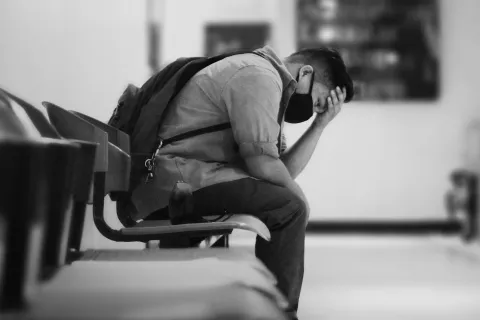British Columbians worried pandemic will never end, and climate change is only adding to the fear

If you're feeling like the pandemic is never-ending, you're not alone. Sixty-four per cent of British Columbians are worried the COVID-19 pandemic will be around for years to come, with concerns about climate change adding fuel to the fire.
The latest results from a national mental health survey led by UBC researchers, in partnership with the Canadian Mental Health Association (CMHA), found that this sentiment was reflected nationally, with 57 per cent of respondents worried that COVID-19 will continue to circulate among the population for years to come. In BC, 65 per cent of people are worried about new strains and nearly half of respondents in the province are worried about the compounding effects of COVID-19 alongside the climate crisis.
This is the fourth round of the Assessing the Impacts of COVID-19 on Mental Health survey led by Dr. Emily Jenkins (she/her), an associate professor in the school of nursing at UBC, and Dr. Anne Gadermann (she/her), assistant professor in the school of population and public health. Conducted in December 2021, almost a year after the third survey, it was completed by a nationally representative sample of 3,030 people ages 18 and up living in Canada.
And it's the first time the survey has included a question about climate change anxiety, says Dr. Jenkins. "With the heat domes and atmospheric rivers BC experienced in 2021, there was more awareness of climate crisis effects compounding mental health struggles alongside the pandemic. All these different issues were colliding and we wanted to account for that."
Differential impacts
Consistent with previous rounds, these latest results highlighted the inequities in how different groups of people are affected by the pandemic, says Dr. Jenkins.
Forty-one per cent of people in BC say their mental health has declined since the onset of the pandemic, compared with 37 per cent nationally. These numbers spike in vulnerable groups such as those who are unemployed due to COVID-19 (57 per cent), had a pre-existing mental health condition (54 per cent), identify as LGBTQ2+ (49 per cent), are students (47 per cent) or have a disability (44 per cent).
Such inequities are dividing our society into haves and have-nots when it comes to mental health and illness, she says. "The pandemic has made it impossible to ignore the longstanding service gaps and systemic barriers in our systems."
"We're seeing the signs of chronic stress on the population," says Margaret Eaton (she/her), national chief executive officer of CMHA. "It's time to check the engine light on our mental health system." CMHA also released a new report today, Running on empty: how community mental health organizations have fared on the frontlines of COVID-19, featuring interviews with community mental health organizations in Canada to examine how they have been impacted by and responded to the pandemic.
Canadians don't know where to go for help, but coping well with stress
Almost one-in-five, or 17 per cent, of respondents living in BC felt they needed help with their mental health during the pandemic but didn't receive it. Among those, 35 per cent didn't know how or where to get help, 41 per cent indicated they couldn't afford to pay for it and 37 per cent reported that access to care was limited.
"Improving Canadians' mental health is about more than just increasing access to care," says Dr. Gadermann. "We need to address the root causes of mental health inequities through promotion and prevention, in addition to treatment."
The good news is that most respondents in BC reported they were coping very or fairly well with stress related to the pandemic, at 76 per cent, with exercise or going for a walk identified as one of the key coping mechanisms.
"We need to ensure equitable access to treatment and services, take action on the social and structural issues that cause these inequities and sustain investment in these efforts beyond the conclusion of the pandemic. It's time to put in the work to address the longstanding barriers to good mental health in our society," says Dr. Jenkins.
To access a complete summary of the findings, visit CMHA's Round 4 findings.
This article originally appeared on UBC News.
Photo by christopher catbagan on Unsplash


